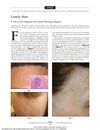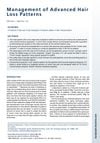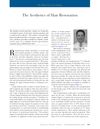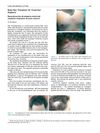Search
for
Sort by
Research
480-510 / 1000+ results
research Inhibition of Hair Growth by Testosterone in the Presence of Dermal Papilla Cells from the Frontal Bald Scalp of the Postpubertal Stumptailed Macaque
Testosterone can slow down hair growth when combined with certain cells from bald scalps, and this effect can be blocked by an androgen receptor blocker.
research BH06: Clinical Trial of Combination Therapy with Oral Hydroxychloroquine and Topical Tacrolimus Versus Oral Finasteride and Topical Tacrolimus in Frontal Fibrosing Alopecia

research Lonely Hair
Isolated long hairs at the original hairline can help diagnose Frontal Fibrosing Alopecia.
research Frontal Fibrosing Alopecia: Report of Three Pediatric Cases
Frontal fibrosing alopecia can occur in children, not just postmenopausal women.

research Androgenetic Alopecia at Various Ages and Prostate Cancer Risk in an Equal-Access Multiethnic Case-Control Series of Veterans
Early balding, especially frontal, increases prostate cancer risk; more research needed.

research Hormonal and Reproductive Factors and Risk of Upper Gastrointestinal Cancers in Men: A Prospective Cohort Study Within the UK Biobank
Men with frontal male pattern baldness may have a higher risk of gastric cancer.

research Management of Advanced Hair Loss Patterns
Use a frontal forelock pattern to manage advanced hair loss.

research Comment on 'Effect of Pumpkin Seed Oil on Hair Growth in Men with Androgenetic Alopecia: A Randomized, Double-Blind, Placebo-Controlled Trial'
Pumpkin seed oil may help hair growth, but more research needed on frontal hair loss and long-term effects.

research The Aesthetics of Hair Restoration
Hair restoration, especially at the hairline and frontal hair volume, can improve facial balance and attractiveness, with follicular unit transplantation being a successful method.

research Surgical Approaches to Hair Restoration
Experts suggest various surgical methods for hair restoration, including scalp reduction, transplantation using minigrafts, and establishing a permanent frontal hairline with follicular units. The drug finasteride may also be used alongside these procedures.

research Response to Effectiveness of Dutasteride in a Large Series of Patients with Frontal Fibrosing Alopecia in Real Clinical Practice
The authors suggest that 5-α-reductase inhibitors, like dutasteride, are effective in treating frontal fibrosing alopecia and should be the first-line treatment, with other options for severe cases. They also recommend further research on Janus kinase inhibitors.

research Sonographic Comparison of Subcutaneous Fat Layer Thickness in the Scalp Area in Patients with Androgenetic Alopecia Compared to Healthy Individuals: Cross-Sectional
Patients with androgenetic alopecia have thinner subcutaneous fat layers in their frontal scalp compared to healthy individuals.

research Disseminated Small Papules on the Face: A Quiz
The woman's skin and hair symptoms were confirmed as frontal fibrosing alopecia, and while facial papules are common in such cases, there's no effective local treatment, but systemic treatments can help.

research Acquired Hyperpigmentation and Cicatricial Alopecia
The document concludes that doctors should check for frontal fibrosing alopecia in patients with acquired hyperpigmentation and that early treatment is important.

research Researchers Link Early Hair Loss and Prostate Cancer
Early hair loss may increase the risk of prostate cancer, especially in African American men and those with frontal baldness.

research A Comparative Study on the Efficacy and Safety of 10% Topical Minoxidil Versus 5% Topical Minoxidil in the Treatment of Male Pattern Hair Loss
10% minoxidil improves frontal hair count more than 5% but has more side effects.

research Trichoscopy II: Cicatricial Alopecia
Trichoscopy helps tell apart Lichen planopilaris and Frontal fibrosing alopecia from other hair loss conditions.

research Cicatricial Alopecia with Particular Trichoscopic and Histopathological Features
The document concludes that a woman has both Frontal Fibrosing Alopecia and Lichen Simplex Chronicus, a previously unreported combination of conditions.
research Frontal Fibrosing Alopecia
Early diagnosis and treatment of frontal fibrosing alopecia are crucial to prevent permanent hair loss.

research Laser Treatment in Frontal Fibrosing Alopecia: A 2017 Study
Laser treatment may help with hair growth in some people with frontal fibrosing alopecia, but results vary and the exact way it works is unclear.

research Proceedings of the Ninth World Congress for Hair Research 2015
The 2015 Hair Research Congress concluded that stem cells, maraviroc, and simvastatin could potentially treat Alopecia Areata, topical minoxidil, finasteride, and steroids could treat Frontal Fibrosing Alopecia, and PTGDR2 antagonists could also treat alopecia. They also found that low-level light therapy could help with hair loss, a robotic device could assist in hair extraction, and nutrition could aid hair growth. They suggested that Alopecia Areata is an inflammatory disorder, not a single disease, indicating a need for personalized treatments.
research Dermatopathology Quiz: Which Alopecia Does the Patient Have?
The patient has frontal fibrosing alopecia (FFA).
research Frontal Fibrosing Alopecia Associated with Pigmented Lichen
Frontal fibrosing alopecia can occur in children, not just postmenopausal women.

research Lichen Planus Pigmentosus and Lichen Planus Pigmentosus: 35 Cases in Armenia, Colombia
Lichen planus pigmentosus and fibrosing frontal alopecia in Colombia are likely different stages of the same disease.

research Body-Hair Transplant for Cicatricial Alopecia
Body-hair transplant successfully improved scarred areas and frontal hair density without visible chest scarring.
research Lichen Planus Pigmentosus and Lichen Planopilaris
Some people with lichen planus pigmentosus might later develop frontal fibrosing alopecia.

research An Overview of Female Pattern Hair Loss
Female pattern hair loss involves thinning hair on crown and frontal scalp, diagnosed by hair ratio, and treated with minoxidil, antiandrogens, or hair transplantation.

research Clinical and Phototrichogrammatic Evaluation of Estradiol Replacement Therapy on Hair Growth in Postmenopausal Japanese Women with Female Pattern Hair Loss: A Pilot Study
Hormone replacement therapy may improve hair growth in the frontal hairline of postmenopausal women with hair loss.

research Aesthetic Importance of the Parietal Eminence Area (Posterior Parietal Triangle), an Essential Island of Scalp Requiring Hair Restoration
Hair restoration should include the parietal eminence area for better balance in frontal and lateral profiles and to improve the head's contours.